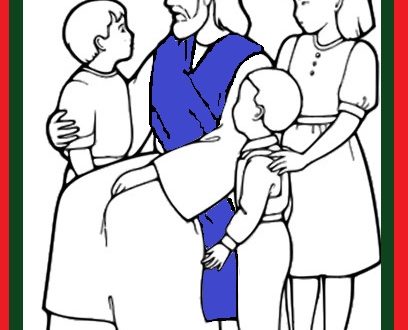Confidence-Building Communication
To develop positive self-esteem, children need to experience a sense of belonging. They need to feel connected to something bigger than themselves. Because many children come from broken, dysfunctional, or non-nurturing homes, being part of a class at church may be one of the few ways they satisfy this need. Many experts agree that the increase in gangs today is due to a growing number of kids who need to feel a part of something. Gangs may be the only avenue they see to fulfill their need to belong.
To develop positive self-esteem, children need to experience a sense of belonging. They need to feel connected to something bigger than themselves. Because many children come from broken, dysfunctional, or non-nurturing homes, being part of a class at church may be one of the few ways they satisfy this need. Many experts agree that the increase in gangs today is due to a growing number of kids who need to feel a part of something. Gangs may be the only avenue they see to fulfill their need to belong.
Treasured teachers help their students feel PART of something bigger than themselves by leading them to see themselves as:
P – Privileged to be a partner in God’s plan.
If your children choose to give themselves to Jesus, remind them that they are part of the most winning team in the history of the world! They are children of a Heavenly Father who loves them very much, and he has planned from the beginning for them to participate in his eternal purposes.
A – Affirmed in their position.
Always greet children by name, and show that you are happy to see them. Allow time for children to greet and interact with each other. Choose a class name to build group identity. Write a slogan that expressed this group’s unique contribution or goals. Create a cheer to build camaraderie. Post pictures of each child in the class, or let them each have space to create their own mini-bulletin boards. Recognize absences with a card or phone call. Undertake some service project your class can do together. (Even preschoolers can do this!)
R – Responsible to each other.
You don’t need to carry all the responsibilities of a class by yourself. Enlist the help of each class member. Assign tasks within the class. Let them bring in some of the teaching items. Have the children design and write out postcards. Create opportunities for special service.
When I was a minister to children, we had one student with very low self-esteem. Hal was hungry for love, but he went about getting it in all the wrong ways. As a result he had few, if any, friends.
When my children were babies, I kept them in my office until they were old enough to attend school. The students in fifth through ninth grades like to get their work done quickly in study period or eat their lunch as fast as they could so they could baby-sit for me. One day Hal asked if he could watch my son Christopher. I hesitated and then suggested that we take him for a walk together. I showed him how to hold Christopher properly and taught him the basics of caring for a little one.
This same child who had often been rough with his peers become a pillar of gentleness! Christopher responded very positively to Hal, who quickly became a favorite of his.
Hal finished his work quickly each day so he could baby-sit Christopher for a while. Christopher often sought out Hal as well. Hal felt that he made a difference in someone’s life, and as a result, his self-esteem improved greatly. He became more loving and gentle with the other students. Instead of trying to grab power by being a bully, he found a true place of belonging by being a gently, loving, caring person.
T – Take-charge kind of people.
Children need to feel that they have some power and can contribute in some way. This does not deny the sovereignty of God; it simply means we show children they have the power to affect their environment. For example, we know that if a child is negative and we continue to reinforce that, we will perpetuate it. If we praise a student’s efforts to improve, our comments serve as a catalyst for positive change. Children need to see that they have power to affect others’ perceptions of them.
Clearly, our society continues to be plagued by a “victim mentality.” A young man robs because he is the “victim” of his parents’ poverty. A racist goes on a rampage because he was a “victim” of affirmative action and lost his job to someone else. A student cheats on a test because the teacher “didn’t teach it right.” These examples of abdication of person responsibility are the exact opposite of what we are taught to be in Christ (Philippians 4:13).
We can help children develop a sense of “can-do” by looking closely to see what each child is good at and building on that strength. This gives students a sense of the positive use of power in which we utilize God-given strengths to make a difference in the world.
I often use these words to encourage children, “Each of us is really good at some things and really lousy at some things. Sometimes it takes years to find what we are really good as, so we need to keep on trying new things. Eventually we will discover out strengths.” Like adults, children tend to focus on their weaknesses, and that leaves them feeling powerless to make an impact in life. They may not realize who they are in Jesus Christ and assess their self-worth by others’ perceptions.
When you believe in your students and communicate that to them, you have created an island of security for them. Those children will want to come back each week to the place where they “belong.” A Sunday school teacher may provide the only safe island that a child has.
Amy was in my sixth-grade class. She was very quiet the day we studied the passage from Romans 12 on spiritual gifts. After class I asked if she would help me carry my things back to my car.
“What did you think about class today?” I asked as we walked together. Immediately her eyes began to tear. We sat in my car and had a long talk. Amy had never realized that God created people differently for his special purposes. She had always felt second best compared to her outgoing sister, and as a result, she often retreated from the spotlight.
When she asked me what I thought her spiritual gift might be, I told her I thought she would make a marvelous teacher. Her eyes lit up.
“Yes,” she responded, “I always dreamed of being a teacher.” That summer I encouraged Amy to be a teacher-helper with the preschoolers for Vacation Bible School. The rest is history. She is a wonderful teacher today!
The Bible has much to say about encouraging one another. It is amazing how an encouraging word can not only change a person’s day, but even make an eternal difference.
Therefore encourage one another and build each other up, just as in fact you are doing (1 Thessalonians 5:11).


